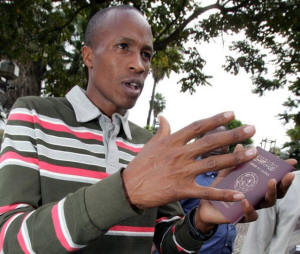|
Qatar's recruited athletes stir debate on citizenship
 Send a link to a friend
Send a link to a friend
 [August 25, 2016]
By Tom Finn [August 25, 2016]
By Tom Finn
DOHA (Reuters) - When 39 athletes from
Qatar qualified for the Rio Olympics, the most in the tiny Gulf
state's history, Noor al-Shalaby celebrated the achievement in a
Facebook post.
"Qatar! You are in my blood and my soul," wrote the 34-year-old
accountant.
The small team delivered the country's first silver medal at the Rio
Olympics.
And the Olympians - at least 23 of whom were born outside Qatar and
brought in to help the country flourish athletically - are a source
of pride for Egyptian-born Shalaby, who was raised in Qatar.
But their status is also a reminder of restrictive citizenship laws
that have complicated Shalaby's life and made her future uncertain.
Qatar has for years used its immense oil and gas wealth to recruit
sportspeople from around the world, part of an ambitious vault onto
the world sporting stage by the wealthy Arab state which will host
the soccer World Cup in 2022.
Kenyan runners and Bulgarian weightlifters granted citizenship to
compete internationally for Qatar are compared by outsiders to
'mercenaries' sent to win medals for Doha and promote its standing
abroad.
But the practice of handing passports to these athletes has stirred
a debate about national identity inside Qatar where residents like
Shalaby who have lived in the country for decades, and whose
expertise may be needed in a post-oil economy, have no obvious path
to citizenship.
"I was born in Doha... my friends are Qatari and, in my heart, I am
too." she said. "Of course it hurts that I am not a citizen."

LAWS 'OUTDATED'
The influx of foreigners into the once-impoverished Gulf states goes
back to the discovery of oil in the 1930s.
The growth of hydrocarbon industries brought in thousands of Arab
workers, including Syrians and Palestinians, to bolster small local
populations.
Many secured jobs and settled in the Gulf among local Sunni Muslim
populations who had traditionally lived in the desert or in small
coastal towns, living off pearling and trade.
But as numbers of foreign residents rose and millions of South Asian
laborers were brought in to power construction booms, tightly-knit
Gulf populations saw demographic change as a threat to their way of
life.
Attuned to this, Gulf authorities have kept heavily guarded rights
to nationality.
Qatar, a former backwater that is the world's largest LNG exporter,
is home to a vast foreign population that ranges from low-paid
construction laborers living in camps outside cities to top
executives who receive generous tax-free salaries.
No legal provisions exist allowing foreigners, who account for
around 90% of Qatar's 2.3 million population, to become permanent
residents.
Instead a handful of foreigners who must speak Arabic and have
resided in the country for at least 25 consecutive years are
absorbed into Qatar’s citizenry on a case by case basis that
requires approval from the emir.
A Qatar government spokesperson was not immediately available to
comment. Officials, including the former emir, Sheikh Hamad bin
Khalifa al-Thani, have said nationality is given to people who apply
and fulfill regulations.
[to top of second column] |

Saif Saaeed Shaheen, Qatar's 3,000 metres steeplechase world
champion, speaks to the media in Kenya's capital Nairobi September
20, 2006. REUTERS/Antony Njuguna/File Photo

"ADDING VALUE"
But some younger Qataris are now questioning the laws controlling
citizenship, calling them outdated.
"If these guys [athletes] get naturalized then what about doctors,
scientists, engineers, academics and artists? Don't they add more
value to society?," Hamad al-Khater, a public sector employee,
tweeted after the Olympic debut of Qatar's handball team, 11 out of
14 of whom are naturalized athletes.
A prominent Emirati commentator argued in a 2013 op-ed for
citizenship to be opened to long-time foreign residents including
entrepreneurs, scientists and academics who have contributed to
society.
But many remain deeply apprehensive about relaxing citizenship laws:
they fear the added expense - Qatar spends billions of dollars each
year on free education, healthcare, and housing loans for its
estimated 300,000 citizens - and question whether naturalized
citizens could ever become true Qataris.
"Even without naturalizing people, our identity is in a kind of
crisis. Giving out passports would complicate things," said
businessman Abdullah al-Mohannadi, 32.
There is concern too that foreigners might have an adverse influence
on Qatar's dynastic political system and conservative culture -
based on deep-rooted tribal values that are already considered under
threat.
"What happens down the line when these individuals and their
descendants call for change and go against Qatar’s political
stability?" said Faisal al-Shadi, a Lebanese student born in Qatar.
"These citizens might come together and challenge the status quo".
After growth peaks and Qatar moves toward a post-oil economy,
analysts say, the economic rationale for restricting citizenship
could change.

"Qatar will need to attract long-term residents who can contribute
to the tax base and support what will eventually become an aging
population," said a Doha-based university lecturer.
"Residency rights are one way to entice professionals to stay in the
country for longer."
(Editing by William Maclean and Richard Balmforth)
[© 2016 Thomson Reuters. All rights
reserved.]
Copyright 2016 Reuters. All rights reserved. This material may not be published,
broadcast, rewritten or redistributed. |